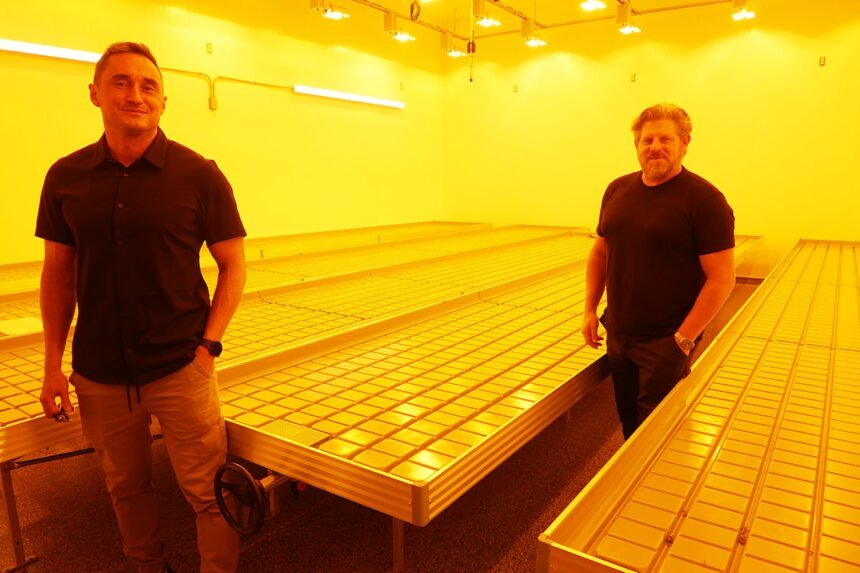
Facility will research and develop cannabis products for market under Coast Salish Canna brand name
Snuneymuxw First Nation is looking to grow its Coast Salish Canna brand with the construction of a cannabis micro grow operation.
A 13,000-square-foot production facility near the First Nation’s gas station and cannabis store on Macmillan Road is nearing completion and, pending licensing, could begin operations by the end of September. When production does start it will bring a range of products that will be researched, produced and distributed under SFN’s Coast Salish Canna brand.
“We’re essentially complete here. We’re just doing the odd and sods and getting the actual production and the grow side ready to roll,” said Jason Guild, head of cannabis operations.
During a tour of the facility July 11, electrical workers were making final connections to the facility’s four 2,100-square-foot grow rooms, offices, drying, processing and packaging rooms, employee kitchen, decontamination rooms and other spaces that will support production, research and sales.
“We have four separate reservoirs and each one of these gets plumbed into each of the rooms to feed every table,” Guild said. “We’ve designed it so each individual room is its own environment. We don’t have any cross-contamination. So, if you run into a problem and you have to kill off a room, you still have the other three rooms to go.”
Crops will be harvested once a month, dried for 18 days and processed by hand to separate the buds from the plants.
“Old school, table in the middle and chairs all around, and using hand trimmers,” Guild said.
He said the curing process is just over 21 days. Harvests will be staggered so that one growing room is harvested each month. About eight people will be employed during non-harvest operation periods, but during harvest the facility will employ 12 to 14 people. The goal is to hire and train as many Snuneymuxw members as possible.
“A lot of the jobs here, too, are low barrier to entry,” said Ian Simpson, chief executive officer of Snuneymuxw First Nation’s Petroglyph Development Group. “Of course, there’s some very skilled positions we need as well, but [we have] a good opportunity for younger folks and some of our younger band members that are willing to work hard and get trained up on the job and there are some pretty good career opportunities here.”
Per-harvest production per growing room is anticipated to be about 45 kilograms or about 550kg annually, but there will be different production targets for the various cannabis varieties that will be grown.
“That’s the big one, is your genetics,” Guild said. “We’ve got a couple of secret ones coming out here – we can’t really give too much information. Our master grower’s doing some testing right now. They’ll be really unique. We’ll have both sativa and indica. So, that’s a big reason why we have four rooms. Just like any other market, things get stale. They want the newest thing, so we’ve got the ability to keep changing.”
Coast Salish Cannabis aims to supply B.C. Cannabis Stores within the province and possibly the Ontario market, and also has packaging equipment that meets export requirements.
“I think we really going to concentrate on building our brand for the first little while, but if there is an opportunity for us to make some good revenue, just to keep the wheels turning, we’re not hamstrung,” Guild said. “The key is being able to not only grow, but process your own product, because that generally takes a large chunk of your margins.”
Coast Salish Canna will also produce its own brand of vapes and pre-rolls and will also carry out its own on-site research and development of edibles.
Investment for the building and processing equipment is more than $3 million. Funding for the project has come through the Nuu-Chah-Nulth Economic Development Corporation and the B.C. Indigenous Cannabis Business Fund through the New Relationship Trust, which provided non-repayable funds to First Nations communities and entrepreneurs working to generate economic opportunities in the cannabis sector.
“We were able to tap into some funding to subsidize the investment we’re making here, which made it a much easier decision to pull the trigger on it,” Simpson said.
Under the latest government cannabis regulations, Coast Salish Canna could build up to three more cannabis micro-grow facilities, but there’s a balance to be struck between large-scale production and product quality.
“The people that use these types of products, they’re very much connoisseurs,” Simpson said. “They know the difference between good weed and bad weed and you need to produce top-quality product to be getting a good price. That was our kind of strategy from the outset, not to be producing the maximum volume that we possibly could.”
For video on the project development, visit http://newrelationshiptrust.ca/snuneymuxw-cannabis-economic-growth.












